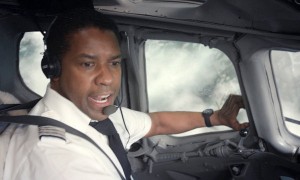Flight
Directed by Robert Zemeckis
Written by John Gatins
USA, 2012
Denzel Washington oozes charisma from every pore. Over the last two decades, he’s been one of the few actors whose charm can boost even the weakest effort, capable of elevating himself and his fellow performers above meager material. As he’s aged, Washington has shrewdly chosen roles that either downplay his strangely innate ability to play uber-heroic figures, or twist his charisma on its ear. (The best example, frankly, of a blending of both types is his Oscar-winning performance in Training Day, where he plays a purely villainous character who was once a better man.) In Flight, Washington delivers again, superb and almost entirely internal in his methods, as a truly screwed-up figure meant to exude courage.
Washington is Captain Whip Whitaker, a longtime airline pilot who wakes up in Orlando one morning with a massive hangover and a flight to Atlanta coming up fast. To perk himself up, he takes a few swigs of booze, snorts some cocaine, then gets into the cockpit. As soon as he gets his plane in the air, however, disaster strikes: a malfunction causes the plane to dive toward the ground, and Whip is forced to pull a miraculous maneuver and emergency landing to save the innocent lives aboard. Almost everyone survives, but Whip’s troubles persist when a toxicology report reveals what was in his system that morning, and he slips further into addiction despite the help of a fellow recovering addict.
The word “soul” is mentioned a number of times during the crash sequence—the first 30 minutes of Flight, partly because its tone is vastly different from the rest of the film, is incredibly intense and gripping—and that’s what the film wants to be about: Whip fighting for his soul, his very spirit. It’s clear from the opening scene that he’s got a massive problem, springing from his estrangement from his ex-wife and son. At the core of Flight is a simple question: will Whip accept his baggage and try to fix it? Immediately after the flight, he’s aware that it’s time to make a change, actively refusing alcohol from a boisterous ex-pilot friend (John Goodman, only in the film for about 10 minutes, but a potent source of humor) and dumping out the extensive contents of his homemade bar. As his situation worsens, with a seemingly helpful but officious attorney (Don Cheadle) breathing down his neck, Whip becomes more prone to drowning in liquid temptation.
Flight works best when it’s a two-hander, focusing on Whip and Nicole (Kelly Reilly), the younger female addict he connects with while they both recover in the hospital, he from the crash and she from an overdose. John Gatins’ script, though, doesn’t fully commit to watching both of these people try to fix heal themselves; the opening half-hour cuts between Whip’s hellacious morning and Nicole’s tragic-for-different-reasons day, emphasizing that, no matter what the marketing promised you, this isn’t just a star vehicle. Their relationship is tentative, halting, and always somewhat unfulfilled. However, when Nicole is phased out of the story with about 50 minutes to go—at just about 140 minutes, Flight is perhaps a bit too long, despite never dragging—it becomes less clear what her purpose as a character was. And it’s a shame, because Reilly’s quite good as Nicole, a woman with her own problems and pain that’s exacerbated under Whip’s negative influence.
Because the script can’t completely give itself over to a second lead, Flight does end up being laser-focused on Whip. And make no mistake, Washington’s excellent in the film, roiling with rarely vocalized anger and bitterness. It’d just be nice if he’d had someone to share the stage with, as opposed to feeling like he’s hogging all the attention. Robert Zemeckis, returning to the non-motion-capture world of the living after 12 years, leaves most of his stylistic tendencies at the door outside of that terrifying crash sequence. Something he and cinematographer Don Burgess do quite well is let the camera linger on Washington’s face, looking a bit more paunchy and aged than in recent years. He’s still got some of that youthful spark, certainly, but Denzel Washington is letting his age show. In Flight, this choice only enhances Whip’s struggle, his unwillingness to leave childish things behind.
Flight is, in tackling the issue of alcoholism and addiction, prone to being too melodramatic and corny as the plot twists mount. And in some ways, nothing after the terrific first 30 minutes could dare come close to its high-wire balancing act of fear and excitement. Robert Zemeckis’ first live-action film since Cast Away is, perhaps, not as ambitious as that Tom Hanks drama, but just as in that film, he has one of the best leading men Hollywood has to offer in Denzel Washington, willing to get down and dirty, portraying a man who’s always been so close to the end of his rope that he’s ready to jump off into the great unknown. The movie as a whole may not be perfect, but Washington sure is.
— Josh Spiegel




